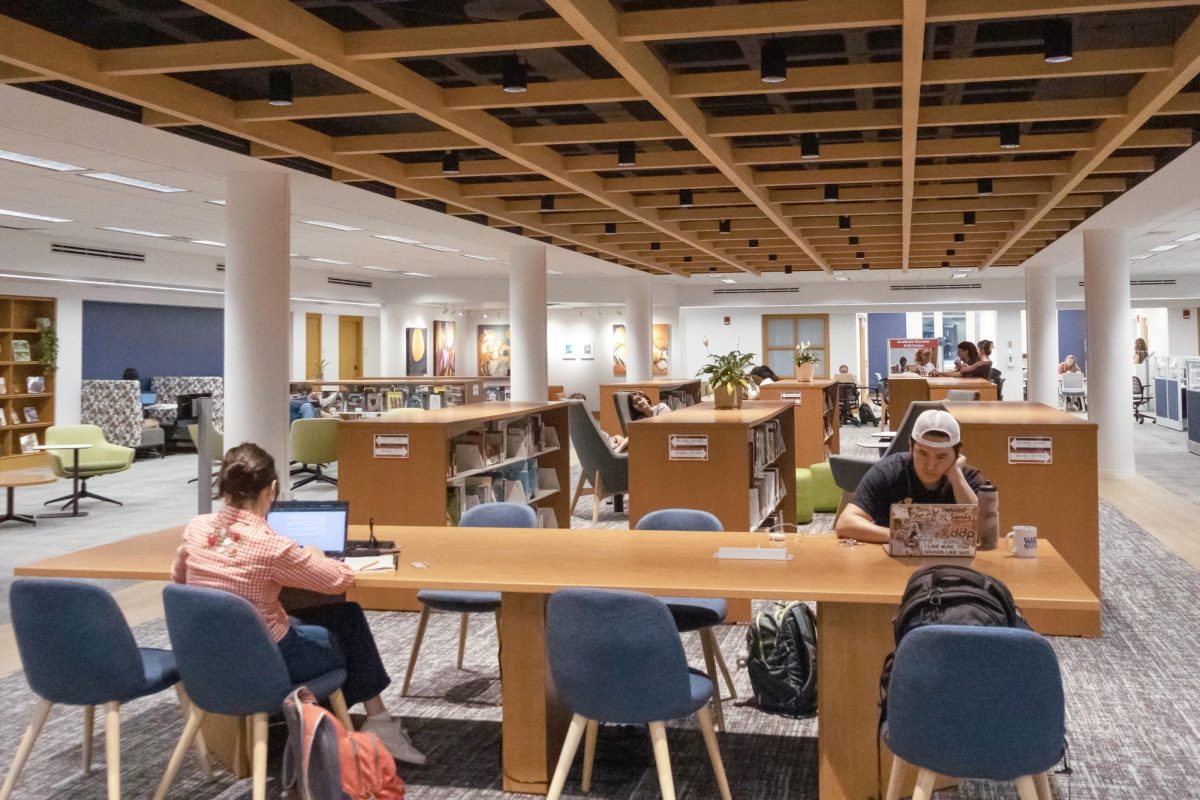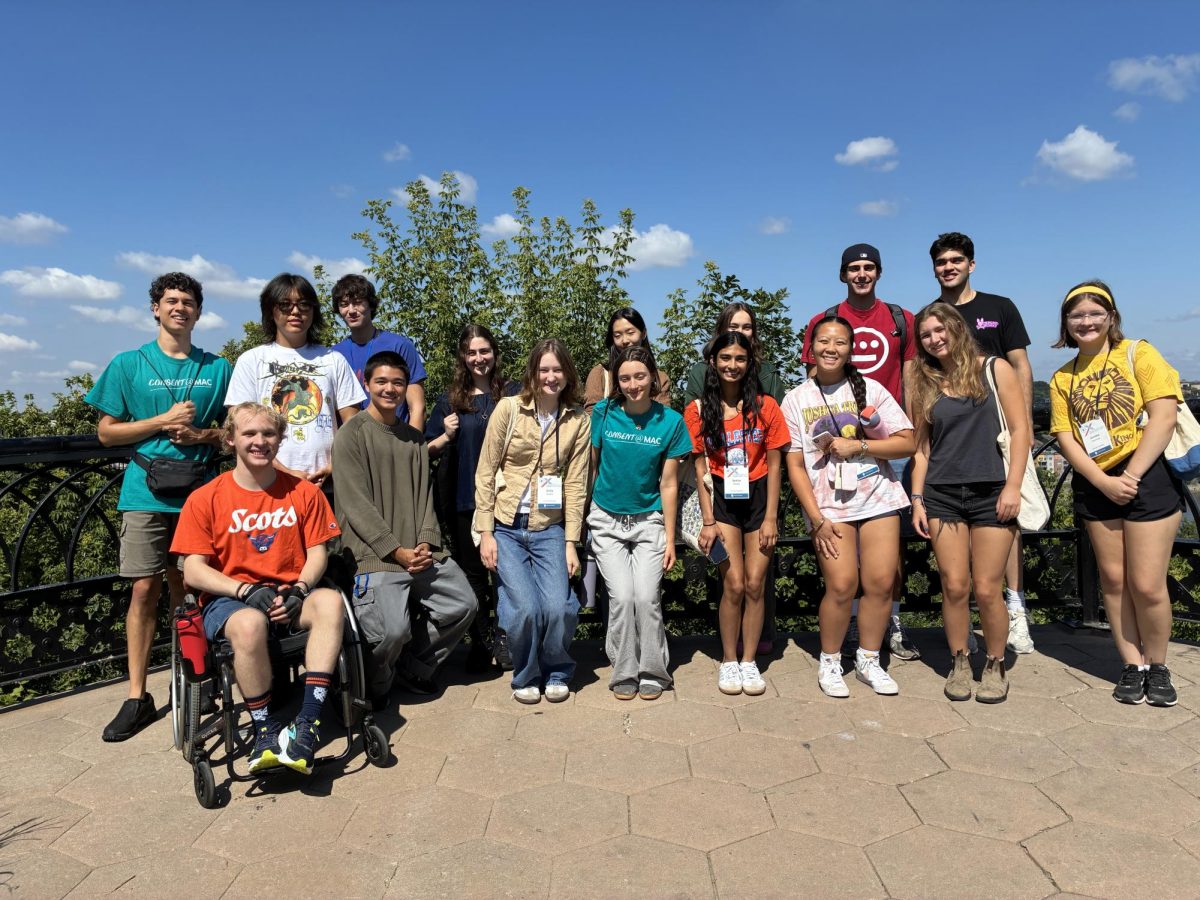On Wednesday, Feb. 7, the Macalester Undergraduate Workers’ Union (MUWU) went public with their efforts to unionize student workers at Macalester. They hope to improve working conditions on campus, bargain for a fair contract and support student employees in all aspects of their jobs. If they succeed, they will become the first student union in Macalester’s history.
While most students have responded positively to MUWU’s announcement and mission, reactions across campus vary widely.
Since MUWU’s announcement last week, scores of students have signed a union card or solidarity petition. Some of these students believe strongly in the benefits a union brings.
“Unions are a way for students to have a voice in their workplace … and they provide a level of security that you just can’t get anywhere else,” Ari
Zeren ’27, co-chair of Macalester Young Democratic Socialists of America (YDSA), said. “Once you have a union, you have the ability to work together, to look out for each other, to collectively bargain for what you need together.”
Other students who signed a union card or petition did so with a more vague interest or were simply following friends’ leads. Supporters also vary in what they want from the union; some have had difficult on-campus work experiences and have specific demands, while others feel good about their jobs and just want to stand in support of those who need it most.
MUWU members welcome both of these viewpoints. They stress that the benefits that students with easier jobs enjoy are not protected in writing and can be dependent on a good boss; a union would fight to include these benefits in a contract and expand them to more student workers.
“Signing a union card doesn’t just represent saying ‘I want better things for myself,’” MUWU organizer Jasper Knabe ’27 said. “It is ‘I want better conditions for everyone and I want to be a part of something that will help accomplish that.’”
Some student groups, on the other hand, know well that they stand to benefit from a union.
One of these organizations is the First-Generation, Low Income Student Union (FSU). FSU co-founders Matté Lopez ’25 and Richard Rose ’25 describe first-generation and low-income (FGLI) students as the most impacted by the issues a union could address. For instance, FGLI students struggle with wages and transparency about tuition, issues that MUWU could bring to the surface, Lopez said.
“Union issues are FGLI issues and the other way around,” Rose said. “There’s no way to separate the two; we have to support each other.”
Yamalí Rodas Figueroa ’27, a formerly undocumented student who works with undocumented students on campus, offered feedback on how MUWU can better incorporate undocumented students. Undocumented students cannot receive federal work study, and Rodas Figueroa hopes that MUWU will advocate for jobs that undocumented students can take and help create on-campus work opportunities for them. Amherst College, one of Macalester’s “comparison colleges”, provides fellowships and stipends that allow undocumented students to work on campus, and Rodas Figueroa wants to see something similar at Macalester. MUWU organizers are taking these asks into consideration, and Rodas Figueroa stands in support of the union.
“I work with undocumented students, and this is something they want,” Rodas Figueroa said. “They want to be able to have the opportunity to work. They have knowledge, they have expertise, they have skill sets that they should be compensated for, and I want them to have that experience of being able to be compensated for their skill sets.”
In addition to these activism-oriented organizations and students, clubs without much of a political focus have shown up in support of MUWU. For instance, representatives from Mac Anime and Macalester Table Tennis Club attended a MUWU-student org solidarity meeting last Sunday, along with members of FSU, Macalester Organizing Coalition (MOCO), QuestBridge, YDSA, IfNotNow and Mac for Palestine.
“[I’m here to] show this is across the campus and not something that is just a certain small slice of the community; this is something that is for everyone,” Marty Stoner ’25, a representative from Macalester Table Tennis Club, said.
Despite these positive reactions, other students and groups have points of hesitation with MUWU. In their Feb. 11 meeting, MUWU leaders detailed the most common points of criticism that they have received.
A number of students are worried that the union efforts will make their working conditions worse or that they will face retaliation if they join the union. According to MUWU leaders, this fear is especially strong among some low-income students, who rely on their jobs more than most higher-income students do and have expressed fears about their scholarships being taken away if they unionize. MUWU members have recognized these worries as valid and told students that it is illegal for employers to retaliate against unionization.
At the Feb. 11 meeting, MUWU acknowledged that some others perceive MUWU as a group of well-off students greedily asking for more than they need. They think that student employees on campus have good work conditions and are well-paid, and don’t need anything else. MUWU organizers stress that plenty of low-income students are part of their organization, that they are committed to fighting for every student worker on campus, and that everyone stands to benefit from a union.
The Macalester administration has not have made any public statements about the unionization efforts, but Vice President for Student Affairs Kathryn Kay Coquemont had an informal meeting with MUWU leaders early this week to learn more about their perspective. In addition, Macalester College Student Government (MCSG) invited a MUWU representative to their Feb. 15 meeting.
“For me, the importance of the union is less about the individual issues … it’s all about shared governance,” Mariah Loeffler- Kemp ’24, MCSG president, said, speaking on behalf of herself, not all of MCSG. “Unionizing gives us another structure in place to have greater say in decisions that are made about our own [work] experiences. I’ll always be up for greater democratization of our systems and having students have more power.”
On the other hand, some Macalester alumni who heard Macalester President Suzanne Rivera comment on the union at a Feb. 8 sesquicentennial event in Washington, D.C. were disappointed by her response. Rivera expressed a lack of knowledge about the union, saying she had gotten information about it only from social media. MUWU organizers sent Rivera, Coquemont and other administrators an explanatory email in the late morning on Feb. 7, the day they went public.
When Merrit Stüven ’17, who attended the Feb. 8 event, first mentioned the union, a small cheer went up in the crowd. Later, attendees talked about their excitement about the unionization efforts, which they see as being in line with Macalester’s values. Stüven stressed that the crowd included a lot of younger D.C. residents, who often skew pro-union. However, large numbers of alumni have expressed their support by signing a solidarity petition.
Despite the varied reactions, MUWU is continuing to fight for a union. They have been collecting union cards and solidarity petition signatures every weekday at lunchtime since they went public, and new people have been signing every day. They also have been holding meet and greets most weekdays to talk to interested students and answer questions.
MUWU will be holding an informational town hall on Friday, Feb. 16 at 5 p.m. in the Carnegie basement, a union song singalong in partnership with Macalester Groove Group from 1–2:30 p.m. in the Weyerhaeuser Chapel on Saturday, Feb. 17 and a rally on Friday, Feb. 23.













